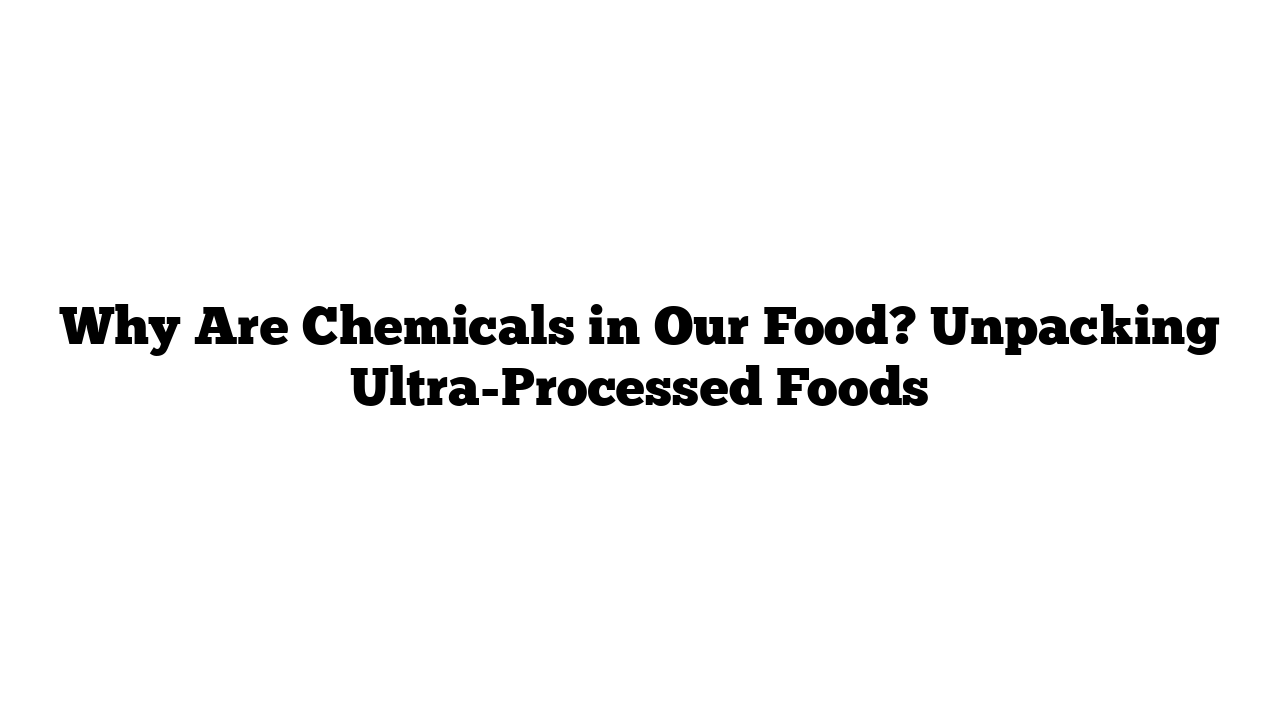Picture this: it’s a busy morning, and you’re rushing to grab a coffee and a cookie on the way to work. Maybe you also have a sandwich for lunch and a ready meal for dinner. Sound familiar? If it does, you’re not alone. This routine is common for many people today. But have you ever wondered what’s actually in those foods? Let’s dive into the world of ultra-processed foods (UPF) and explore why they might not be the best choice for your health.
What Exactly Are Ultra-Processed Foods?
Ultra-processed foods are items that have been heavily altered from their original state. Think of snacks, sugary drinks, and instant meals. They often contain additives like sugars, fats, and preservatives. A recent study revealed that these foods make up over half of the calories consumed in various countries. That’s a lot of processed munching! Unfortunately, this trend is linked to serious health issues like diabetes, obesity, and even cancer.
The Health Risks of Ultra-Processed Foods
So, what’s the big deal with ultra-processed foods? I recently chatted with an expert in genetic epidemiology who examined my typical lunch of a tuna sandwich, lemonade, and chips. He raised an eyebrow at the ingredients, questioning why they included palm fat and wheat starch. Many diet drinks, like that lemonade, might say “healthy,” but they often contain artificial sweeteners. It’s like putting a health halo on a junk food crown!
Mind-Blowing Statistics
In the UK, over half of the average household’s calorie intake comes from ultra-processed foods. The food and beverage industry is booming, valued at $128 billion, and employing hundreds of thousands of people. But is convenience really worth the risk? Research shows a clear link: higher intake of ultra-processed foods can lead to increased cancer risk and obesity rates. Yikes!
A Quick History of Food Processing
Food processing isn’t a new concept. Our ancestors started cooking food over a million years ago. Early techniques included baking, fermentation, and salting, all aimed at making food safer and more palatable. However, by the 1950s, processing shifted from preservation to convenience. Today, ultra-processed foods are engineered to be irresistibly tasty, often loaded with sugar, salt, and fat, which can make them hard to resist.
The Link Between UPF and Health Issues
Let’s get into some numbers. A study following nearly 200,000 people showed that for every 10% increase in ultra-processed food consumption, there’s a corresponding rise in cancer risk. Not only that, but a higher intake is also associated with obesity and type 2 diabetes. Non-communicable diseases, like heart disease and diabetes, account for a staggering 74% of global deaths. Scary, right?
The Price of Healthy Eating
In the UK, one in four people are classified as obese—the highest rate in Europe. This issue of rising obesity coincides with food insecurity, where healthier foods like fruits and vegetables often come with a hefty price tag. For many, the convenience and affordability of ultra-processed foods are just too tempting to pass up.
Striking a Balance
Finding the right balance is key. Not everyone has the time or resources to focus on healthy eating. A nutritionist pointed out that many people work multiple jobs or have tight budgets. So, it’s vital for governments and businesses to step up and improve access to nutritious foods instead of putting the entire burden on individuals. It’s like asking someone to lift a car when they can barely carry a grocery bag!
The Role of Investors in Food Regulation
As the conversation about food quality heats up, investors are getting involved. A coalition of investors is calling for better regulations in the food industry. They want mandatory reporting on health and sustainability metrics, so we can all understand the risks associated with unhealthy food products. Talk about accountability!
Steps Toward Transparency
Some food giants, like Nestlé and Unilever, have started to disclose the nutritional value of their products. However, these steps are voluntary, meaning companies can essentially grade their own homework. If you’re a business leader wanting to invest in healthier food options, you’re taking a big risk since it’s not a level playing field.
Can We Completely Avoid Ultra-Processed Foods?
It’s tough but not impossible to avoid ultra-processed foods altogether. You’d have to live like a health guru—think of it as a full-time job! Eating should be enjoyable, not a chore. However, for those looking to make healthier choices, here are some simple tips:
- Embrace Plant Power: Aim for 30 different plants each week to maximize your nutrient intake.
- Fermented Foods are Your Friends: Regularly enjoy yogurt, kimchi, or sauerkraut for better gut health.
- Give Your Gut a Break: Try fasting for 14 hours overnight to help your gut microbes rest.
- Cut Down on UPF: Aim to reduce your intake of ultra-processed foods for better overall health.
By following these tips, you can make a positive change in your eating habits. Remember, eating should be about enjoyment and nourishment, not just quick fixes. With a little mindfulness, we can all work towards a healthier future!
